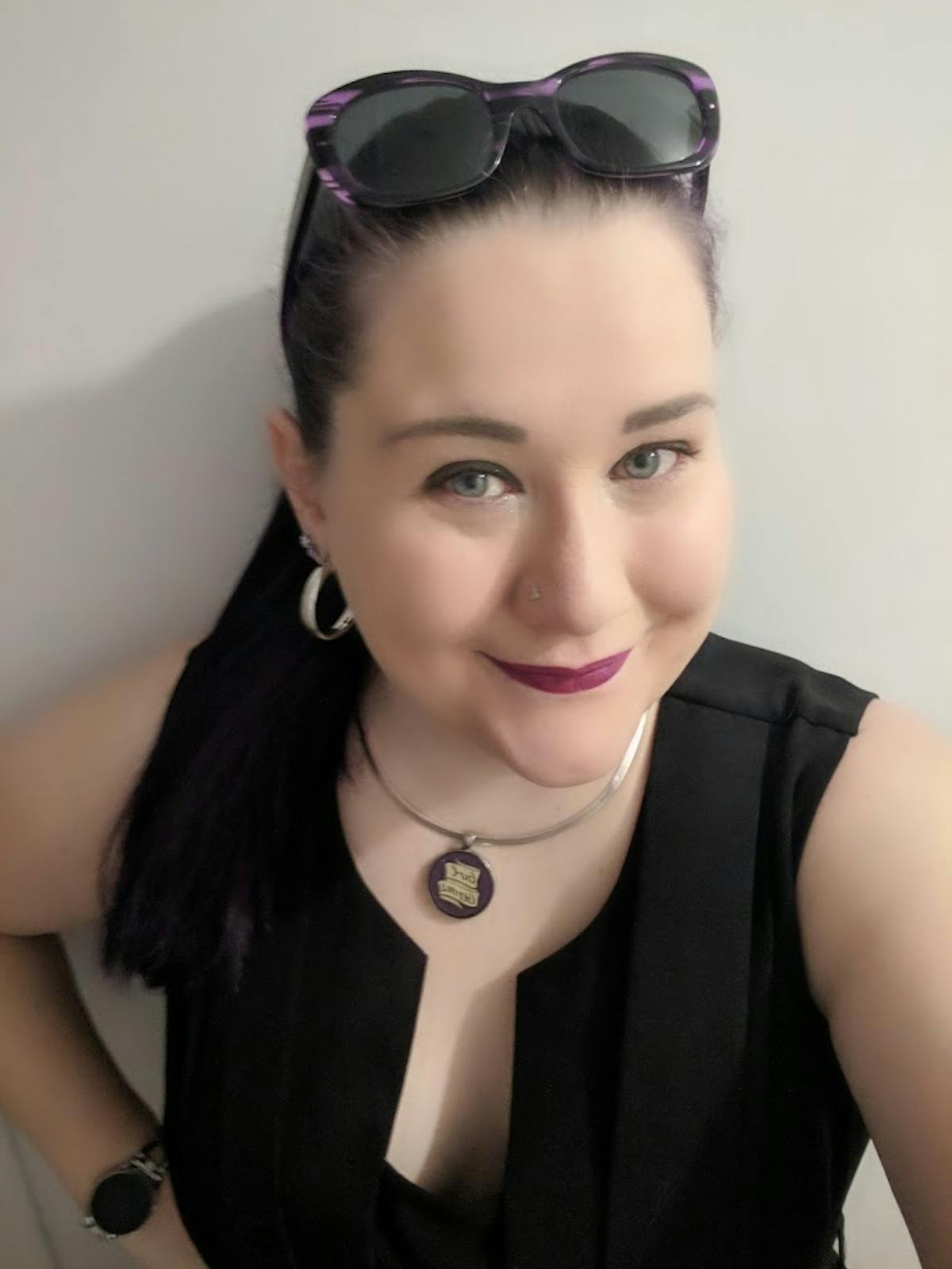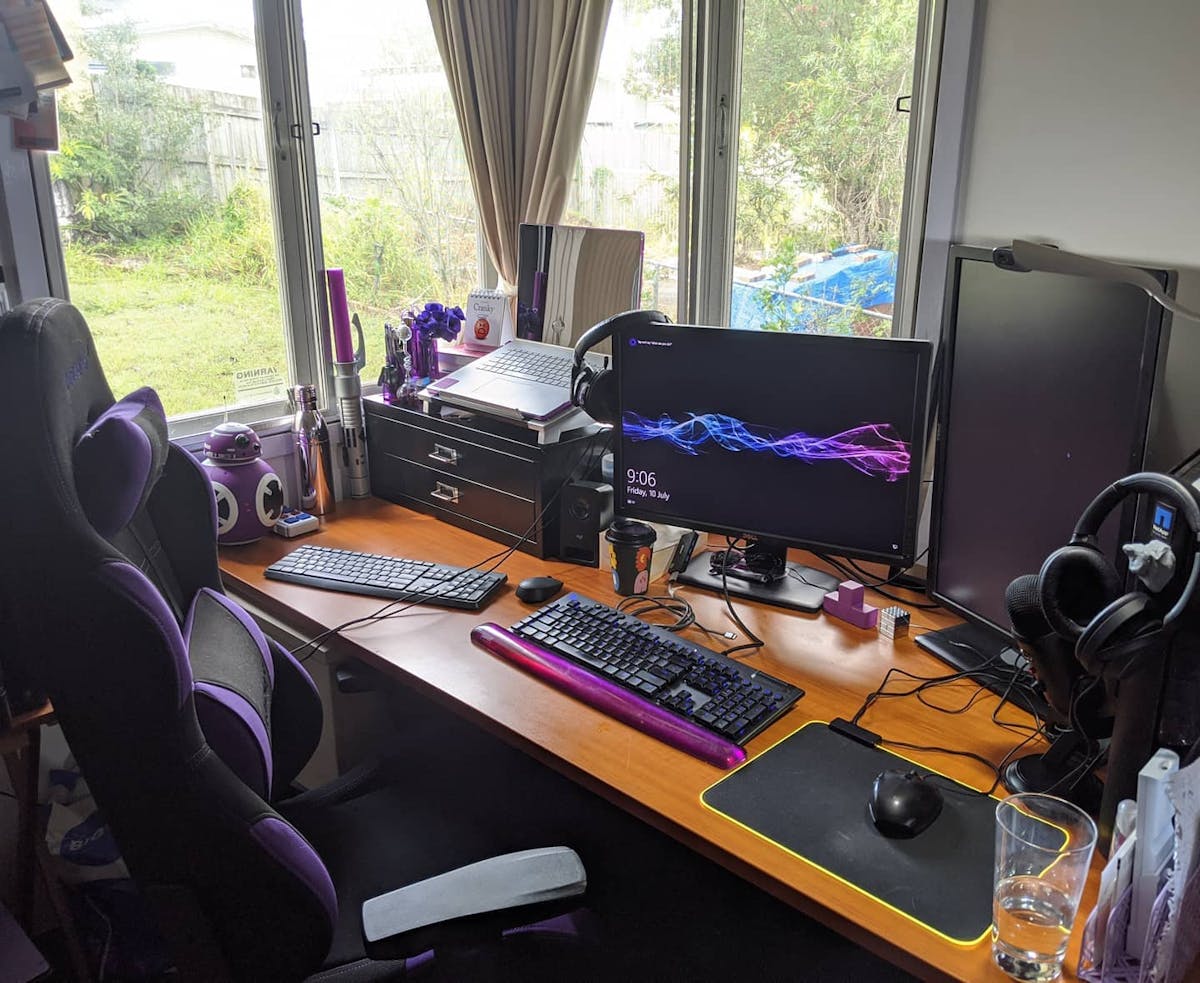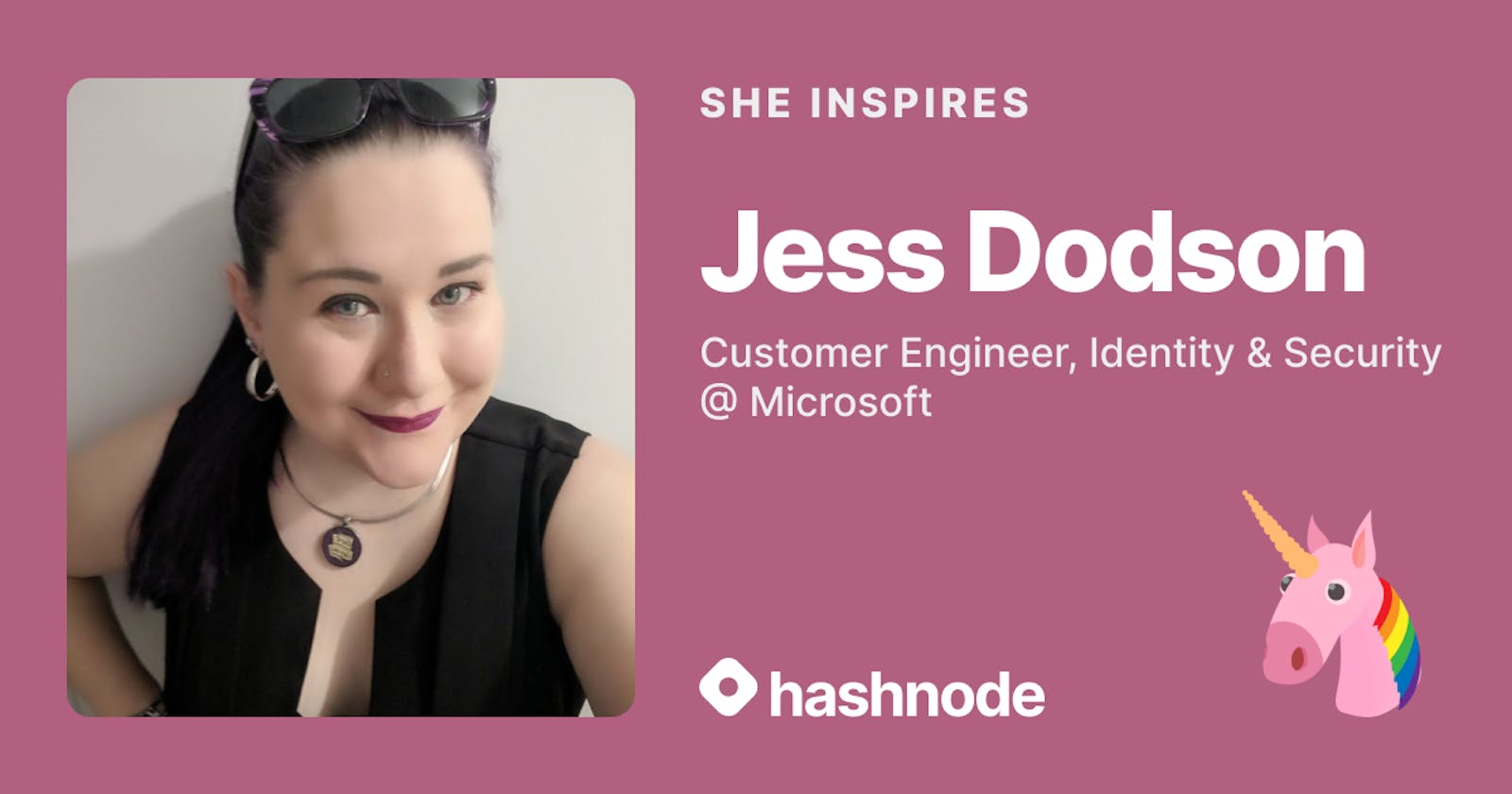Today, we have Jess Dodson 👩💻, a Windows System administrator, currently working at Microsoft as a Customer Engineer in Identity & Security. Jess is big on passing on information to others that’s technically relevant, as well as passing on information that, while not technical, is useful for those in system administration.
The other thing is to surround yourself with a tribe of people who will lift you up and will talk away those demons. These are people who know you, who you trust, and who support you - and you support them too.
— Jess Dodson
In this interview, you'll learn how Jess started her career in tech, her 15 years journey so far, advice on tech, and experience at the University of Queensland and Microsoft. 💜

Please tell us a little bit about yourself. How and when did you venture into tech?
Jess: I loved tech from a young age due to my dad and when I didn't get into university like I wanted, I went to TAFE (technical college). Once I finished that, I started at the bottom of the ladder - I worked helpdesk for a while, then ended up becoming a systems administrator! I actually wrote a detailed post on how I got into IT back in 2014: girl-germs.com/?p=309
Can you briefly tell us about your job title?
Jess: I work for Microsoft and my job title is "Customer Engineer" with a side specialty of "Identity & Security modernization" - which really does detail what I do. I help Microsoft customers with work related to their identity and security. I spend time with customers - be that system administrators, security analysts, infrastructure engineers - assisting them with Microsoft tools and technologies to improve their identity platforms and increase their security.
What difficulties have you faced on your way in tech? Have you ever felt like you were not treated as equal?
Jess: I have, yes. It's been an uphill battle for a bit. When I first started, I was seen as "the secretary" despite being the primary helpdesk staffer. I've had my share of denigrating comments, both at work and at conferences. I've had my work, my ideas, my opinions ignored, belittled, or challenged - simply because I was a woman. It can be hard when you're the only woman in the room.
If there is a bias women face, why do you think it is still there, in the 21st century? What are some things people and organizations could do to change this?
Jess: I do think there are biases still. I think changing the way we do hiring and recruiting - and removing unconcious bias from the process - should be something we strive to do. Ensure we're amplifying the voices of those who don't often speak up, and that's not just women. We also need to encourage the allys that we have to speak up as well - we can't be the only ones shouting about this, else it's never going to change.
You previously worked at the University of Queensland and the Department of Transport and Main Roads. How was life at these companies?
Jess: I enjoyed life at both - I learnt so much. I'm still in contact with people I worked with at both places and have mentors and friends from both workplaces. I was lucky in that my career moves weren't due to bad management or discrimination - they were simply due to the fact that I'd outgrown my role and there wasn't anything higher to aim for in the organisation!
You currently work as a Customer Engineer (CE) in Security & Identity Modernization at Microsoft. How long did it take you to arrive here and what significant difficulties did you face along the way?
Jess: It took me 15 years to land the job I have now and I had to work for that. I wouldn't say I'd faced significant difficulties - there were certain times where I felt I was looked over for positions or where promises were made regarding career progression that weren't kept. But I know I'm not alone in that regard. I think the biggest difficulty I faced is proving that I knew what I was talking about - because, as a woman, you're so often seen as the "diversity hire". I wanted to make sure that I earnt my position, that I got here under my own steam and that I wasn't treated as "less than". I know there are some who still think I was hired due to the fact I'm a woman, but I hope my work over the last 18 months has spoken for itself with my customers!
We see that you work predominately in OS Lifecycle Management, Information & Account Security, Windows Server Operating Systems, and Hybrid Systems. How did you decide to focus on these paths?
Jess: Interestingly, that was my old path - I followed the path of efficiency. I looked for things that needed to be changed or that could be changed and made better. Just because something has always been done one way doesn't mean it always has to be done that way. In my last role, I was primarily invested in the maintenance of an enterprise-sized fleet of Windows servers, with a focus on Active Directory and Identity security. I became interested in that because, where I worked, no one else was! Someone needed to fill the hole!
I now focus almost purely on security, with a side focus on identity - because identities are tied so heavily to security! I feel that my background in infrastructure and systems administration gives me an edge when it comes to assisting security teams navigate through utilising Microsoft Azure products, as I have the hands-on experience of knowing what should be looked at wearing both hats - security and infrastructure!
What advice do you have for a newbie or intermediate who dreams to work as a Customer Engineer?
Jess: Start at the bottom - understanding that our functions, as IT professionals, is to serve our customers, our users, is pivotal. Get outside your comfort zone - public speaking raised my profile internally inside Microsoft significantly, and it led to me being award a Microsoft MVP for 3 years running! Never stop learning - there is always something new to learn, always some new tool to play with, some new scripting language to tinker around with.
How long have you been in tech and what word will describe your experience so far?
Jess: I feel like I've been in tech my whole life - my dad is a systems engineer and we've always had computers at home. I built my first machine at a young age, I was tinkering around when I was in high school. But officially working in tech? 15 and a half years.
What word? Unexpected. If you'd asked me 15 years ago where I'd be now, I certainly wouldn't have predicted I'd be working for Microsoft!
We see that you speak and teach at software conferences, how did you get into public speaking and how has it affected your career?
Jess: Getting into speaking at conferences was actually a trap - a friend of mine within Microsoft said they could get me free tickets to attend TechEd (which is what Ignite was known as 'back in the day'). I thought this was fabulous, as tickets were very expensive and my workplace wasn't likely to send me. The catch was that I would have to present a talk. I said yes...then immediately wondered what the hell I'd agreed to! The rest is history. I've now spoken at Ignite here in Australia, in New Zealand, and in the US!
What advice would you give to aspiring developers who look forward to speaking at meetups and/ or conferences?
Jess: Do it. Just do it. The audience doesn't want to see you fail, they're cheering for you, they want to see you succeed and they will learn something from you - even if it's just something small. Jump in and do it.
What do you think needs to be done to encourage beginner developers to learn a technical skill and continue learning?
Jess: Encouragement - I feel that's changing more now, because we realise just how important tech is, but ensuring there's enough encouragement for those who do want to pursue it.
Imposter syndrome is one problem developers face especially newbies, what is your experience with imposter syndrome, how did you manage yours, and what advice do you have for anyone facing this currently?
Jess: Impostor syndrome is AWFUL. I still suffer from it. It's insidious and trying to beat it is tough. My advice is two-fold - whenever something awesome happens in your work, you do something great, you get an award, something goes into production, you get praise, etc. write it down. Whenever impostor syndrome pops up, look at your list of awesome things you've done. It helps.
The other thing is to surround yourself with a tribe of people who will lift you up and will talk away those demons. These are people who know you, who you trust, and who support you - and you support them too. If you feel a bit 'impostor-y' call on them to help pull you out of it.
Rejection emails are another thing that motivates imposter syndrome and depression amongst developers, especially intermediates. How did you manage this effectively during your "job-hunting" days?
Jess: I always take rejection as a learning experience. They obviously rejected me for some reason - so what's that reason. Where can I improve? What was I missing? Is there a skill I need to learn? Do I need more experience in something? Do I need to stretch my wings a bit further and pick up a skill in something that I'd never used before? Is there a qualification or a certification I need to get?
It's very rarely personal, so use it as a learning experience to grow so that the NEXT time you apply, you get it.
What advice would you give to aspiring programmers who look forward to working for companies like Microsoft or Facebook.
Jess: Apply. Even if you feel you don't meet the criteria - apply. The worst they can do is not hire you - but you get the experience of getting your CV in order, of being in interview loops, of meeting some of the people, and hopefully making contacts.
Which of your projects are you most proud of? Can you briefly introduce us to it and why you built it?
Jess: I am 100%, not a developer and I don't build things - I just help make systems run so that developers can build things that rely on my systems! In terms of proudest "build", I'd say the previous identity system I helped put in place. The redundancy, consistency, and recoverability of it meant that it was idiot-proof. It could be handed to anyone in the team, there was ample documentation on how to make it function and I was extremely proud of having that all done prior to leaving.
What is the best advice someone has given you that has helped you in your career?
Jess: Do the thing. If there's a thing to be done? Do it. You won't regret it.
What are your favorite programming tools?
Jess: VSCode & Log Analytics
What does your development environment look like?

I've been working from home for the last 7 months, so this is my home office 💜
Finally, what would be your message to women trying to get into technology?
Jess: Find a tribe of women to support you, so that when the times get tough, you have women who can support you. Stand your ground - you know your stuff, you are good at what you do and your voice should be heard. Don't stay at a workplace that doesn't appreciate you.
Thanks for taking out time to read this interview. 👋
This series is all about talking to the awesome women in tech, understanding the current health of the tech industry, and inspiring other women to become better. If you want to share your story, please reach out to me on Hashnode.
Did you find Jess's story useful and inspiring? Write down your thoughts in the comments section below and don't forget to share this interview. You can also follow Hashnode on Twitter to stay up-to-date with our future She Inspires interviews.
See you next time and keep trailblazing 💪💙

